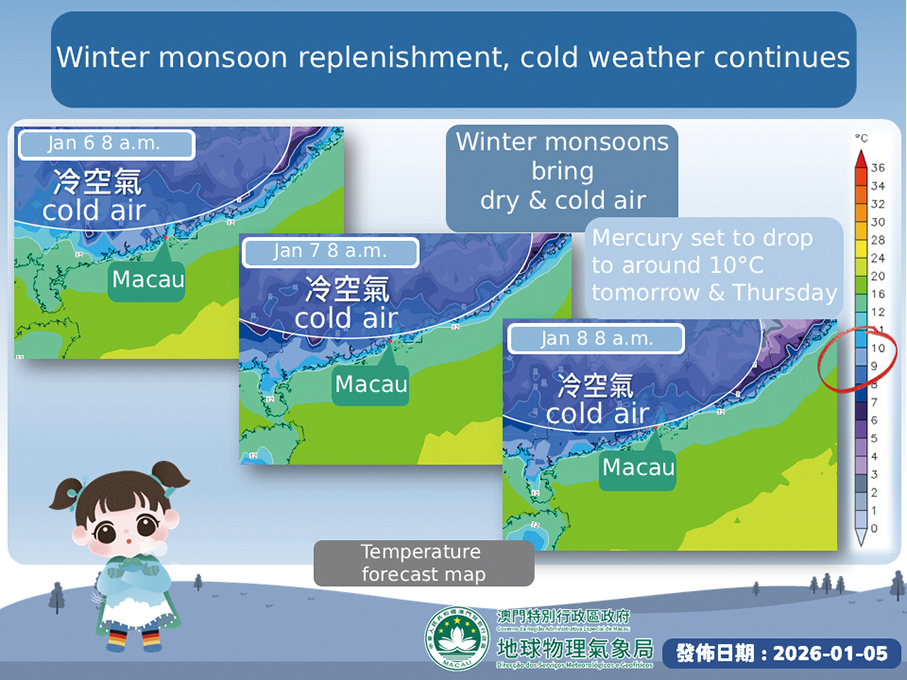Editorial
At its 30th anniversary, the Basic Law of the Macau Special Administrative Region (MSAR) – its constitutional backbone alongside the Constitution of the People’s Republic of China (PRC) – is as vital as ever.
On Friday, the Basic Law celebrated the 30th anniversary of its adoption by the 8th National People’s Congress (NPC) and its promulgation by Jiang Zemin, the nation’s then president, on March 31, 1993.
It was an historic day for Macau, which was then still under Portuguese administration, as it got its first ius constitutionis. Addressing Friday’s ceremony about the event, Chief Executive Ho Iat Seng described the anniversary as a “historic day” marking a “magnificent route” since its promulgation three decades ago.
Communist Party of China (CPC) Political Bureau Central Committee member and NPC Vice Chairman Li Hongzhong pointed out in the ceremony’s keynote speech that the Basic Law “has formed the constitutional foundation for the MSAR together with the Constitution of the PRC, defined the constitutional order of Macau, and provided an all-round legal guarantee for the development of various causes in Macau.”
The history of “our” Basic Law began in September 1988 when its drafting committee was set up under the NPC.
I was among the several dozen journalists who covered the Basic Law drafting and consultative process (a consultative committee was established in May 1989) between late 1988 and early 1993. For a journalist, covering the process was both a great challenge and an opportunity. It was challenging because of all the political and legal complexities involved but it also posed an opportunity to deepen one’s knowledge of China’s intensifying opening-up and reform drive.
I was particularly impressed by two central government officials directly involved in Hong Kong and Macau transition affairs at that time – Zhou Nan (now in his mid-90s), a former deputy foreign minister and China’s second ambassador to the United Nations, a witty, cultivated and strong-willed personality; and Lu Ping, head of the State Council Hong Kong and Macau Affairs Office (HKMAO) during the crucial years for the two foreign-ruled Chinese cities’ process of returning to the exercise of national sovereignty, who was an equally witty, cultivated and strong-willed character. Both knew very well how to defend China’s national interest and how to communicate effectively with journalists. Lu passed away in 2015, aged 87.
I met Zhou and Lu several times in Macau and also at the White Swan Hotel in Guangzhou. At that time the hotel had the reputation of serving the best coffee in the Chinese mainland. As a coffeeholic, I can attest to it, and quite a few members of the drafting committee meeting at the hotel were delighted about it as well.
As any other codified constitution, the Macau Basic Law consists of a set of fundamental rules governing its subnational body politic as an inalienable part of China. Its Chapter VIII contains specific rules of its own amendment. Constitutions – both those of a nation or a subnational body – are supposed to be entrenched by making it more difficult to be amended than ordinary laws.
In the case of the Basic Law of Macau (as well as the one of Hong Kong), the power of interpretation and amendment is vested in the NPC. That’s perfectly understandable, considering that Hong Kong and Macau are subnational entities.
The Basic Law goes beyond merely listing procedural rights (such as the pre-handover Organic Statue of Macau) by guaranteeing residents a wide range of substantive rights. Its Chapter III (Articles 24 to 44) details residents’ fundamental rights and duties including the “protection of the interests of the residents of Portuguese descent in Macau” and “respect for their customs and cultural traditions” (Article 42), clear evidence of the central authorities’ recognition of, and regard to, the fact that one of Macau’s main characteristics is that it includes one of the world’s largest Eurasian communities (said to number around 8,000), which also includes a sizeable diaspora on various continents, customarily known as the Macanese.
I do remember discussing the minority protection matter on the sidelines of the Basic Law drafting and consultation process with Carlos Augusto Corrêa Paes d’Assumpção, a Macanese lawyer, member of the drafting committee, president of the Legislative Assembly (AL) and a very witty, cultured and strong-willed personality as well. Regrettably, he passed away much too early in 1992, aged just 63.
In an article that I wrote about the Macau Basic Law’s 10th anniversary in 2003*, I pointed out that constitutions are the product of significant political developments such the overthrow of Portugal’s rightwing dictatorship in April 1974, the founding of the PRC in October 1949, or the restoration of East Timor’s independence in May 2002.
Undoubtedly, the Basic Law is a legal document endowed with eminent political significance.
In my article back in 2003, I listed seven main factors demonstrating the political importance of the Basic Law as a subnational constitution (in concert with the Constitution of the PRC):
1) Timing – The Basic Law was drafted between 1988 and 1993 at a time when Macau was still under Portuguese administration. Macau’s Basic Law was promulgated three years after its Hong Kong counterpart and nearly seven years before Macau’s return to the motherland, which gave people in Macau ample time to familiarise themselves with their future “mini-constitution” and reassured them that Macau’s capitalist system and way of life “shall remain unchanged for 50 years” beyond its reversion to Chinese rule in 1999 (Article 5).
2) Authorisation – The Basic Law set up the sine qua non condition that formally “authorised” the creation of the political framework needed for the establishment of the MSAR on December 20, 1999.
3) Legitimisation – The Basic Law legitimised Macau’s political, legal and judicial structures and its existence as a separate entity within the PRC and on the international stage (Macau continues to be, for instance, a free port and a separate customs territory).
4) Stabilisation – As a codified subnational constitution, the Basic Law has granted Macau’s political system stability through the clear definition of the powers, rights, duties and functions of its executive, legislative and judicial authorities. One could say that the Basic Law is a vade mecum for all of us in Macau.
5) Protection – The Basic Law restricts the local government’s powers, while the nearly two dozen articles of Chapter III specifically list citizens’ rights and duties, thereby protecting their fundamental rights. Chapter III contains all the “classic” civic rights such as that “the freedom of the person of Macau residents shall be inviolable.” Besides, it also protects the “legitimate rights and interests of women” and residents’ “right to social welfare”.
6) National Objectives and Political Values – As many other constitutions, the Basic Law, its preamble in particular, promotes national objectives and political values, such as the aim of “upholding national unity and territorial integrity” and implementing the “One Country, Two Systems” principle. That’s plausible.
7) Clarity – As a written constitution, the Basic Law clearly presents the powers, duties, rights and functions of the MSAR’s political, legal, socio-economic and judicial systems in a single, 145-article document (plus a few annexes and decisions by the NPC in its appendix).
Some commentators still mix up the Basic Law of 1993 and the Sino-Portuguese Joint Declaration on the Question of Macau of 1987.
The Basic Law is a national piece of legislation whose drafting process did not include any foreign country. The Joint Declaration is a shared statement by Beijing and Lisbon about the transition towards China’s then still forthcoming resumption of exercising its sovereignty over Macau and, consequently, the end of Portugal’s administration of Macau at midnight on December 19, 1999 (Portugal had unilaterally relinquished all sovereignty claims over its so-called “overseas provinces” – including Macau – shortly after its anti-colonial Carnation Revolution of April 25, 1974, i.e., some 25 years before the establishment of the MSAR). Portugal’s post-1974 Constitution defined Macau as “a territory under Portuguese administration which is governed by a statute appropriate for its special situation” – a classic example of realpolitik.
Lisbon’s institutional involvement with Macau ended on January 1, 2000 when the Sino-Portuguese Joint Liaison Group formally ceased its work (Annex II of the Joint Declaration).
The Basic Law and Joint Declaration are completely different in terms of their political genesis and institutional background. Confusing them is a political faux pas. The Joint Declaration was a key tool during Macau’s transition period between 1987 and 1999. It is now an important historic document that shows that two nations with different political systems can peacefully solve matters left over by history. And that’s what both managed to do.
I expect the Basic Law to remain the most vital manifestation of the vitality of the MSAR for decades to come. Perhaps, there are some amendments on the way. I would, for instance, imagine that Macau’s ongoing integration into the Greater Bay Area (GBA) in general, and the Macau-Guangdong In-depth Cooperation Zone in Hengqin in particular, could possibly result in certain amendments in the medium term. This, of course, wouldn’t be a drama as many constitutions on the national and subnational level have undergone revisions occasionally or even periodically, depending on political developments.
What matters is that the Basic Law will continue to serve Macau’s future development well by remaining vital to its progress.
– Harald Brüning
* RAEM: 10 anos de Lei Básica. Revista Macau, Gabinete de Comunicação Social da RAEM, Livros do Oriente, Lda. May 2003, pages 4-14








